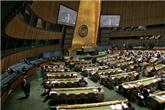21 November 2013 – The United Nations General Assembly on Wednesday unanimously adopted a resolution pledging continued international support to Afghanistan as the country undergoes political, security and economic transitions.
“(The UN General Assembly) pledges its continued support to the Government and people of Afghanistan as they rebuild a stable, secure, economically self-sufficient State, free of terrorism and narcotics, and strengthen the foundations of a constitutional democracy as a responsible member of the international community,” said the 105-paragraph resolution, which had been introduced by Germany’s Permanent Representative to the United Nations, Ambassador Peter Wittig.
The resolution also touched upon the areas of security and transition, peace, reconciliation and reintegration, governance, rule of law and human rights, social and economic development, regional cooperation, counter narcotics and coordination.
The Assembly voiced support for the continuing and growing ownership of reconstruction and development efforts by the Government of Afghanistan.
However, among other points, the Assembly stressed the need to continue addressing the threat to security and stability caused by ongoing violent and terrorist activities by the Taliban, Al-Qaida and other groups, and called upon all Member States to deny those groups any form of sanctuary or financial, material or political support.
Afghanistan is slated to hold Presidential and Provincial Council elections on 5 April next year. The Presidential poll will mark the transfer of power from one elected president to another for the first time in the country’s history. The political transition coincides with a security transition as Afghan security forces have taken up security responsibility from their international allies, who are ending their combat mission by the end of 2014.
The Assembly meeting at UN Headquarters in New York was addressed by a range of diplomatic representatives, including from Afghanistan’s neighbours and donor countries.
In his remarks to the meeting, Afghanistan’s Permanent Representative to the UN, Ambassador Zahir Tanin, emphasized that the coming year for Afghanistan would be crucial – adding, however, that his country was embracing the challenges of the future with “full confidence.”
“Afghanistan’s progress has been huge and to a larger extent unprecedented for a country that is still struggling to leave conflict and violence behind,” he said. Nonetheless, he continued, it was moving towards a new beginning, characterized and guided by the principles of national ownership, leadership and strengthened sovereignty.
Ambassador Wittig of Germany said the long-term partnership between Afghanistan and the international community was evolving.
“By adopting this resolution once again by consensus, the General Assembly will reaffirm its commitment to a prosperous and peaceful future of Afghanistan and send a strong message of support to the Afghan Government and people,” said Amb. Wittig.
Applauding the Afghan Government’s efforts in health, education and security, the United States Deputy Permanent Representative to the UN, Rosemary Dicarlo, said that Afghan security forces were growing stronger and more capable by the day.
She added that the success of political transition next year was, however, not sufficient on its own to end the conflict in Afghanistan. “An Afghan-led peace and reconciliation process was the only way to achieve lasting peace and stability,” said Ms. Dicarlo.
Ambassador Wang Min of China said his government was looking forward to working to ensure an “appropriately resourced” UN Assistance Mission in Afghanistan (UNAMA), referring to the special political mission mandated by the UN Security Council with supporting the Afghan-managed and Afghan-led elections at the request of the authorities.
Speaking on the work of UNAMA, Ambassador Motohide Yoshikawa of Japan said he hoped that UNAMA would play “an increasingly important role in 2014 and beyond.”
Other speakers at the Assembly meeting included representatives of the European Union, the Russian Federation, Pakistan, Iran, Tajikistan (on behalf of the Shanghai Cooperation Organization), Australia, Kyrgyzstan, the Maldives, the Republic of Korea, the United Arab Emirates, India, Italy, Malaysia, Romania, Slovakia, the Czech Republic and Turkey.
[Click here for the summary of the General Assembly meeting on Afghanistan on 20 November 2013.]

